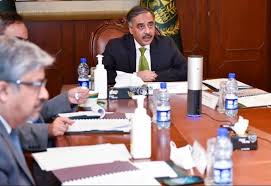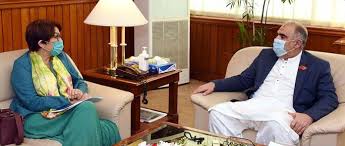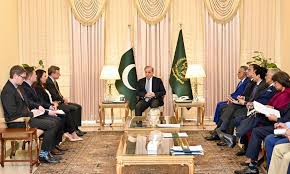6th round of Pakistan-European Union Political Dialogue held

Islamabad: The 6th round of Pakistan-European Union Political Dialogue was held virtually on 6 October 2020. Foreign Secretary Sohail Mahmood and Enrique Mora, Deputy Secretary General of European External Action Service (EEAS) led their respective sides.

The Foreign Secretary noted the special significance of this round of Political Dialogue, being the first since the signing of the Pakistan-EU Strategic Engagement Plan (SEP) in June 2019. SEP is a forward looking and comprehensive framework for Pakistan-EU cooperation in diverse areas.
The 6th round of Political Dialogue covered a broad-ranging agenda- including Pakistan-EU bilateral matters and exchange of views on regional and international issues. The Foreign Secretary emphasized the importance Pakistan attaches to EU as a key international partner and noted the positive trends on the political and economic planes.
He underscored Pakistan’s desire to further expand the existing collaboration, especially in trade, investment, education, science& technology, people-to-people contacts, human rights and development cooperation.
The Foreign Secretary underlined that the government attached great importance to upholding human rights besides Pakistan’s commitment towards implementation of the 27 UN Conventions related to the GSP Plus scheme.
He also highlighted Pakistan’s contributions to counter-terrorism and addressing illegal migration and called for opening new channels of legal migration.
The importance of Strategic Dialogue at the level of Foreign Ministers as well as Summit level interaction to consolidate the relationship was also underlined.
In the context of Covid-19, the Foreign Secretary highlighted the steps taken by the government of Pakistan to minimize the adverse effects of coronavirus on lives, livelihoods, and the economy. He underscored that the ‘smart lockdown’ strategy had paid dividends and Pakistan was being acknowledged by the international community including WHO as a ‘success story’.
The Foreign Secretary acknowledged the importance of the mutually-beneficial GSP Plus status granted by the European Union to Pakistan. He stated that Covid-19 has had a detrimental effect on the world trade, including Pakistan’s exports to the EU. He hoped that Pakistan and the European Union could work together to increase trade in diversified fields.
The Foreign Secretary highlighted Pakistan’s positive contributions to the Afghan peace process and underlined that the historic opportunity created by U.S.-Taliban Peace Agreement and commencement of Intra-Afghan Negotiations should be seized by all Afghan stakeholders to work out an inclusive, broad-based and comprehensive political settlement. He stressed the importance of reduction in violence leading to ceasefire. He also underscored the importance of international community’s close economic engagement with Afghanistan for reconstruction and economic development, which would pave the way for return of Afghan refugees to their homeland with dignity and honour.
The Foreign Secretary apprised his counterpart of the dire human rights and humanitarian situation in Indian Illegally Occupied Jammu and Kashmir (IIOJK), illegal measures to change the demographic structure of the occupied territory, and the threat to peace and security posed by India’s actions. He underscored the importance of the international community taking steps to address the violations of human rights in IIOJK, defusion of tensions, and facilitation of a peaceful solution in accordance with the UN Security Council resolutions and wishes of the Kashmiri people.
While highlighting the issue of increasing Islamophobia globally, the Foreign Secretary expressed hope that steps would be taken to ensure responsibility while exercising freedom of speech.
It was agreed to strengthen Pakistan-EU engagement at multiple levels. Foreign Secretary invited Deputy Secretary General Mora to visit Pakistan as soon as the Covid-19 situation permitted.





